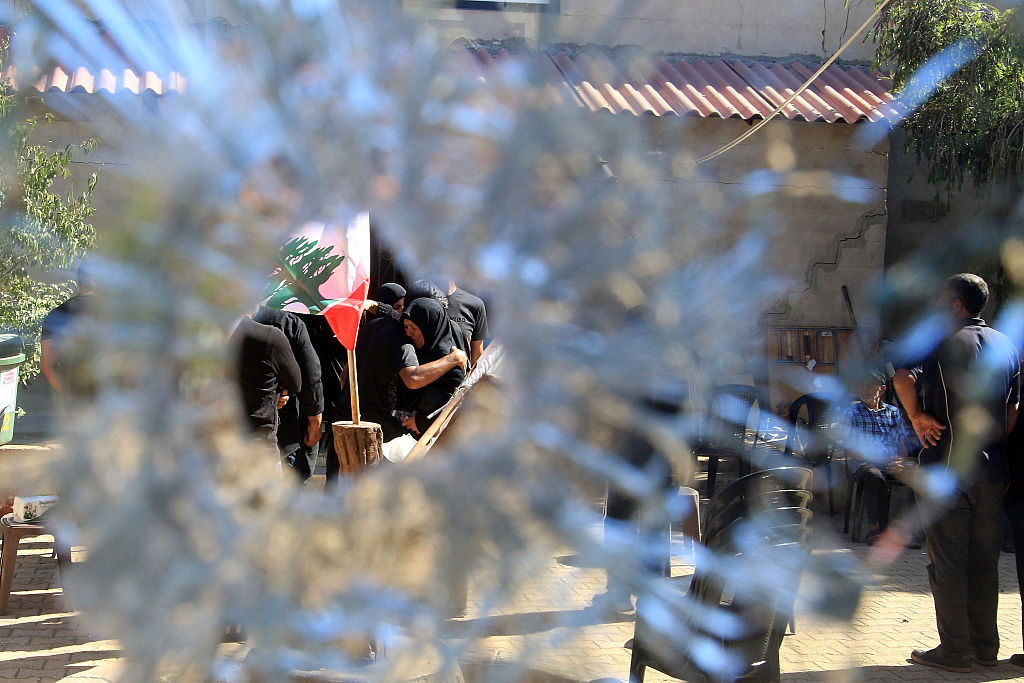At the end of the 2014 film Kingsman: The Secret Service, the plucky spy hero is in trouble deep in an enemy base. Suddenly his tech wizard figures out that he can hack into the microchips inside the enemies’ heads and make them all explode. The bad guys all go boom.
Hezbollah fighters must be asking themselves what other tricks Israel might have up its sleeves
On Tuesday night, the spy thriller trope became real. Across Lebanon, Hezbollah operatives’ secure pagers exploded. Security camera footage showed the small explosions in supermarkets and shops, leaving Hezbollah terror operatives bleeding or worse. More than 3,000 people were injured in the hundreds of blasts, and at least nine were killed, according to the Lebanese Health Ministry. Not all the victims were Hezbollah members: in one case, the young daughter of a Hezbollah operative was playing with his pager when it blew up, killing her. But it seems that the vast majority of injuries hit the intended targets.
According to Saudi TV channel al-Hadath, some 500 Hezbollah members lost their eyesight as a result of the explosions; the pagers rang before they blew up, so many of the owners were holding and looking at them.
Experts speculated that the explosions were too powerful to be caused by overloading the pager batteries. More likely was that there were explosives hidden inside the hundreds of pagers that Hezbollah had only recently acquired. These encrypted pagers were supposed to be a security measure, to prevent Israel from tracking the organization’s communications. Somehow, someone — and Israel and its spy agency Mossad is the only realistic suspect here — managed an audacious supply chain attack, sneaking the explosives inside the pagers before Hezbollah took delivery.
Syria, too, reported pager explosions as Hezbollah operatives near Damascus were hit in the same way. One surprise injury was Iran’s ambassador to Lebanon.

To Israelis, the takedown of Hezbollah’s communications and so many of its operatives seemed like just the first move before a broader Israeli Defense Forces operation into Lebanon. However, no incursion followed. Instead, the ball appears to be back again in Hezbollah’s court as they threaten retaliation. Airlines are already canceling their flights to the region again.
So why did Israel reveal and trigger these pager-bombs now? Immediate speculation focused on a just-foiled Hezbollah plot to assassinate a “former military figure” inside Israel. Perhaps this was a response? But later reporting by Al-Monitor suggested that Hezbollah members were getting suspicious of the rigged pagers, and so Israel triggered them before the sabotage could be discovered, a “use it or lose it” scenario.
The pager bombings were just the latest and most dramatic move in the mostly-neglected war between Hezbollah and Israel that began with rocket barrages into Israel on October 8. More than 100,000 Israelis have been evacuated from the border region, living in hotels for months while their homes are damaged by constant RPG and rocket fire. A similar number of Lebanese have fled northwards, worried about Israeli retaliation.
Neither Israel nor Hezbollah wants a full-scale confrontation. Hezbollah has pounded northern Israel with thousands of rockets and drones, but hasn’t used its huge long-range arsenal to target Tel Aviv. Israel has conducted hundreds of surgical strikes against Hezbollah terrorists but has kept collateral damage and civilian casualties very low.
A year into this limited war, options are running out. Hezbollah had indicated it will stop its attacks if there is a ceasefire in Gaza, and Israel was reluctant to widen the war to Lebanon as long as it could be avoided.
Now, though, the hostage-ceasefire talks with Hamas have effectively collapsed. Without a ceasefire, Israel’s Gaza operations might continue for years. Israeli leaders can’t accept (or afford) an indefinite evacuation of a part of the country. Political pressure has been building for a military operation that would force Hezbollah away from the border.
Partly to that end, Israeli newspapers were filled with speculation on Tuesday that Israeli prime minister Benjamin Netanyahu was about to fire defense minister Yoav Gallant, a political rival who’s been publicly critical of Netanyahu’s handling of the war. Gallant would be replaced by Gidon Saar, a center-right opposition politician with limited military experience. The media was briefed that Saar would lead this new campaign to return the residents of northern Israel to their homes. But polling showed that most Israelis saw the switch as a nakedly political move that would harm the war effort. Following the pager blasts, Gallant’s job is safe for a few days longer.
In 1996, Hamas’s chief bombmaker, Yahya “the Engineer” Ayyash, answered a cell phone and was killed when the explosives hidden inside it were detonated by Israel’s Shin Bet security service. The assassination remained one of Israel’s more celebrated operations, but ultimately it relied on a traditional tactic: forcing an informant to plant the booby-trapped phone. The complexity, scale and scope of the pager-bombs make the Ayyash hit look like child’s play.
Killing Ayyash didn’t stop Hamas, which carried on sending suicide bombers to continue his bloody legacy. And the pager bombs won’t stop Hezbollah, though they’ve damaged and set back the terror group. Hezbollah will continue to escalate and after a year of trying to avoid it, Israel may well find itself fighting in Lebanon again. But Hezbollah fighters, still wounded or partially blinded from their exploding pagers, must be asking themselves what other tricks Israel might have up its sleeves.
This article was originally published on The Spectator’s UK website.


























Leave a Reply